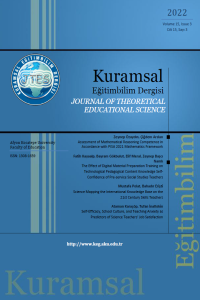Book Review
Research Article
Aim & Scope
AIMS OF JTES
- JTES is a scientific, peer-reviewed and open access electronic journal. We welcome both theoretical and practical research and reviews on education. JTES does not charge any fee for anything.
- JTES aims to shoulder an effective role in establishing an educational system in which individuals can acquire the knowledge, skills and competences of 21th century.
- JTES aims to contribute to the discussion of the educational policies in the world and the reorganization of these policies by collecting the studies in all steps of education ranging from elementary education to higher education in an international platform.
- JTES aims to establish a common ground in which scholars and teachers follow the trends in research and foster their academic development.
SCOPE OF JTES
- Studies analyzing the current situation, problems and positive sides in all steps of education ranging from elementary education to higher education,
- Studies analyzing the subjects related to all stakeholders (learner, teacher, academic, publisher, curriculum designer and so on) in education system,
- Studies analyzing the academic social, cultural and emotional developments of all stakeholders in education system,
- Studies touching upon the educational problems in Turkey and other countries or the studies that contain comparative studies in different countries,
- Studies suggesting theoretical and/or practical models for educational problems.
Author Guidelines
- Our journal only accepts manuscripts in English. Please prepare your manuscript using the title page and template of our journal in the Microsoft Word (doc.) format. To download the manuscript template (click here) and title page (click here).
- Our journal does not charge for article submission and processing fee. As there is no income of our journal, author(s) should have the responsibility of redaction, layout, proofreading and translation.
- Authors have the legal responsibility of the content of their studies. Also, the authors agree on the open-access policy, Creative Commons Attribution-NonCommercial-ShareAlike 4.0 International license and ethical principles of JTES upon their submission.
- Although we do not have a strict word limit, the length of the manuscripts is encouraged to be between 6000 and 10000 words.
- To verify originality, your article may be checked by the originality detection software. High similarity rates might cause editorial rejections.
- Due to ethical considerations, the repetitive submission of a published author is not advised.
- There are no strict formatting requirements but all manuscripts must contain the essential elements needed to convey your manuscript, for example Abstract, Keywords, Introduction, Methods, Results, Discussion, Conclusions.
- As stated in the journal template, Turkish and English abstracts should be between 150 and 200 words. These abstracts should be followed by 3 to 5 keywords (Turkish abstract will be translated for free for the submissions of international authors).
- For all manuscripts reporting data from studies involving human participants, JTES requires that the study have received formal review and approval by an appropriate institutional review board or ethics committee. This review and approval should be described in the manuscript’s Methods section.
- If a multiple-author manuscript is accepted, JTES requires each author to provide a statement of responsibility detailing what he or she contributed to the manuscript.
- In Acknowledgement, authors might list those individuals who provided help during the research (e.g., providing language help, writing assistance or proof reading the article, etc.) or funding information.
- Our journal requires authors to follow APA 7.0 rules as in the Publication Manual of American Psychological Association (7th Edition) for the in-text citation and references.
- Appendices should be added after References.
- To emphasize a part in your texts, please use italics or quotation marks instead of bold option.
- To verify the originality, we check the manuscripts through an originality detection software. When the Editor-in-chief considers the manuscript appropriate for the journal policy and qualified enough for peer-review, Editor-in-chief assigns the manuscript to the relevant section editor or Editor-in-chief might assign reviewers itself. Appropriate and qualified studies are assigned to at least two reviewers based on their expertise, from different universities.
- Reviewers are given 15 days for review but this time length can be extended by Editor-in-chief and/or section editors. If reviewers do procrastinate for a long time, Editor-in-chief and/or section editors might assign new reviewers.
- When reviewers accept a manuscript, Editor-in-chief and/or section editors have the right to accept the manuscripts based on the reviews and to reject by clarifying the reasons for protecting the quality of manuscripts and the prestige of journal.
- The manuscripts that are accepted by reviewers for publication with major or minor corrections are decided to be published if corrections are done in a given time period. If not, the manuscripts can be rejected.
- When the manuscripts receive one acceptance and one rejection by reviewers, Editor-in-chief and/or section editors decide to publish the manuscript based on the decision of the third reviewer.
- The manuscripts that are rejected by at least two reviewers are decided to be rejected. Editor-in-chief and/or section editors do not have the right to change this decision.
- The author(s) retains the right to appeal against the review reports of reviewers. The appeal of authors will be examined by the Editorial Board. If Editorial Board considers the author(s) right for their appeal, new reviewers are assigned for a decision.
Ethical Principles and Publication Policy
- hold the following responsibilities that are based on the guidelines "COPE Code of Conduct and Best Practice Guidelines for Journal Editors" and "COPE Best Practice Guidelines for Journal Editors" published as open Access by Committee on Publication Ethics (COPE).
- submit original manuscripts that have not published before or not submitted to anywhere else for publication.
- indicate just the authors who contributed to the manuscript at the intellectual level.
- should be ready for supply extra documents such as raw data, consent forms and permission forms.
- just submit their submission to one journal at a time.
- agree to review only in their subject of expertise in an unbiased and confidential manner.
- review the manuscript constructively and kindly, avoiding insulting.
- review the content of a manuscript objectively without considering issues such as gender, religion, and politics.
- The manuscripts submitted to JTES for publication should be original ones that have not published before or not submitted to anywhere else for publication.
- Authors agree on the requirements of the open-access policy and Creative Commons Attribution-NonCommercial-ShareAlike 4.0 International license. They also accept to disclaim the copyright of the study by submitting to JTES.
- Since Authors acknowledge transferring the copyright of their studies to JTES, the Editorial Board of JTES hold the rights to continue publication processes. Therefore, Author(s), who want to withdraw their submission, have to send an article withdrawal request to JTES. Their withdrawal request will be evaluated by the Editorial Board of JTES, and the decision will be sent to Author(s) within a week.
- Patent rights,
- All unregistered rights apart from copyright,
- Duplication rights on condition that the study is not sold,
- The right to use the whole or parts of the study in the author's own books or other academic studies on condition that reference is given,
- The right to publish the study on personal websites or open archive of their university on condition that the copyright details are provided.
Price Policy
There is no article processing and submission charges for our journal.
Indexes
Journal Boards
Owner on behalf of Afyon Kocatepe University
Editor-in-chief

Fatih Güngör is an associate professor and head of the Foreign Languages Education Department at the Faculty of Education, Afyon Kocatepe University. He is also the editor-in-chief of the Journal of Theoretical Educational Science indexed in ERIC and ULAKBİM TR Dizin. His main research interests are academic writing, corpus linguistics, and teacher education.
Assistant Editor

Mehmet Ertürk Geçici is currently working as an Assistant Professor in the Department of Mathematics and Science Education at the Faculty of Education, Afyon Kocatepe University. Since 2019, he has held various positions at the Journal of Theoretical Educational Sciences. His main areas of research include problem solving, problem posing, and visual reasoning in mathematics education.
Editorial Board

Dr. Arlinda Beka is a distinguished Associate Professor at the Faculty of Education, University of Prishtina, where she currently chairs the doctoral school, demonstrating her leadership in postgraduate studies. Her academic and professional endeavors are characterized by a strong focus on pivotal areas within education, including the development of early childhood curricula, rigorous educational in research, and the formulation of effective education policies. Dr. Beka's commitment to fostering global collaboration in sustainable development is evident through her active membership in the UNESCO network for Education for Sustainable Development.
Dr. Beka's dedication to continuous professional growth is further exemplified by significant international experiences that have enriched her perspective and expertise. These include a Fulbright Faculty Exchange at James Madison University in the USA and participation in other international professional exchange mobilities, facilitating the exchange of best practices and innovative pedagogical approaches.
Throughout her career, Dr. Beka has demonstrated versatility and a profound commitment to the advancement of education through her active engagement in a wide array of roles and projects. Her contributions reflect a deep-seated passion for shaping effective educational practices and influencing policy development to enhance learning outcomes.

Martin Bílek graduated from the Faculty of Education in Hradec Králové (Czechia) in the field of chemistry and physics teaching, obtained a Ph.D. in pedagogy at the Faculty of Education of Charles University (Prague, Czechia) and was habilitated and inaugurated in the field of theory of chemistry teaching at the Faculty of Science at the Matej Bel University in Banská Bystrica (Slovakia).
Currently he works at the Faculty of Education of Charles University, where he has successively held the positions of Head of the Department of Chemistry and Chemistry Didactics, Vice-Dean for Science and Research and Vice-Dean for Lifelong and Distance Education. Prior to that he worked at universities in the Czech Republic (UHK, UJEP) and abroad (NTNU Trondheim, University of Maribor, Matej Bel University in Banská Bystrica, UKF in Nitra). In his professional activity he deals mainly with didactics of chemistry and his broader range of professional interests includes didactics of natural science and technical subjects, methodology of natural science cognition, pedagogical and disciplinary didactic research, use of ICT in education and other areas related to education and applied informatics. He is a member of a number of professional societies, scientific councils and expert committees, e.g. ad-hoc committees for pedagogical disciplines of the Slovak Higher Education Accreditation Agency or vice-chairman of the Committee of the Expert Group for Chemical Education of the Czech Chemical Society. He is or has been an investigator of MOST projects from Horizon2020, MaSciL from EU FP7 or GEM from EU LC programme, several projects of GAČR, TAČR and other scientific and development projects. He has published in journals focused on science education and applied informatics and is the author of several monographs, e.g. Didactics of Chemistry - Research and Undergraduate Teaching, Towards Virtualization of School Experimental Activities, Psychogenetic Aspects of Didactics of Chemistry, Interaction of Real and Virtual Environment in Early Science Education: Tradition and Challenges and Natural Science Education in the Information Society. ID ORCID 0000-0002-1076-4595

Ali Yildirim is Professor of Pedagogical Work at University of Gothenburg in Sweden. He received his Ed.D. degree from Columbia University in 1993, and later worked at Middle East Technical University in Turkey for 25 years. He provided consultancy to Turkish Ministry of Education in nationwide research projects such as national achievement testing, parent education and vocational education. He served as educational consultant to World Bank financed projects in Turkey such as Preservice Teacher Education Development Project. Currently, he leads Didactic Classroom Studies with around 50 researchers at University of Gothenburg. His research interests include teaching and learning processes, curriculum planning and assessment, teacher education, and social studies education. His published books and articles focus on teacher education, instructional planning, thinking and learning skills, teaching of social studies and qualitative research. e-mail: ali.yildirim@gu.se https://www.gu.se/en/about/find-staff/aliyildirim, https://www.gu.se/en/research/didactic-classroom-studies, https://www.gu.se/en/research/sallt, https://www.gu.se/en/research/mentor-growth, https://www.usn.no/english/for-partners/teacher-research-literacy/

Educational Technology and Computing

Prof. Dr. Mehmet Şükrü Bellibaş completed his undergraduate education in Educational Sciences at Istanbul University (2009) and his doctorate in Educational Administration at Michigan State University (2014). Bellibaş, who became an Associate Professor in 2017, became a Professor in the field of Educational Sciences in 2024. Prof. Bellibaş currently works for the University of Sharjah in the United Arab Emirates. Prof. Bellibaş has more than 50 articles published in journals indexed in respected national and international directories. Prof. Bellibaş's research area is educational administration.


Bülent AYDOĞDU is a Professor in the Department of Mathematics and Science Education, Faculty of Education, Afyon Kocatepe University. He teaches STEM Applications and Scientific Research Methods at the graduate level, and science education, interdisciplinary science education, science curriculum, approaches to science learning and teaching, material design in science education, laboratory safety, and experimental techniques at the undergraduate level. His research interests include science education, STEM, STEAM, E-STEM, science laboratory, science process skills, argumentation-based learning, teacher education, and inquiry-based learning. He has also served as a director or researcher in numerous TÜBİTAK, European Union, and BAP projects.


















